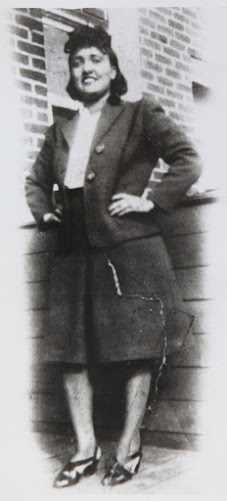A few days ago, the family of Henrietta Lacks filed a lawsuit against Thermo Fisher Scientific. Their lawyer says Thermo Fisher "shouldn't feel too alone because they're going to have a lot of company soon."
Maybe you don’t know the name, Henrietta Lacks? I only know it because I read Rebecca Skloot's 2010 book, The Immortal Life of Henrietta Lacks, which details Ms Lacks' short life and unending scientific afterlife. |
Henrietta Lacks (1920-1951) |
At Johns Hopkins, her cervical cancer was misdiagnosed, and she died a few months later, at just 31 years of age.
While she was hospitalized, a tissue sample from Henrietta’s growing and soon-to-be fatal tumor was sent to a doctor named George Gey (1899-1970). He wasn't Henrietta's doctor, and probably never met her, but he was a researcher at Johns Hopkins. The hospital routinely collected tissue samples from all its cancer patients, and sent them to Dr Gey's lab. The patients were never told, which wasn’t unusual at the time. "Informed consent” is only a recent concept.
Ordinarily, human cells can’t survive long under laboratory conditions, but Dr Gey discovered that Henrietta’s cells were different. For reasons still not understood, the tissue samples from Henrietta thrived, so long as a growth medium was provided. They could even be frozen, and when thawed the cells would start growing again. That’s all unique — and has proven incredibly valuable to medical research.
Henrietta's cells have been used extensively in research into cancer, AIDS, and other diseases from herpes to Parkinson's to the flu. They were crucial in development of the polio vaccine, and recent COVID-19 vaccines. More than twenty tons of Henrietta's cells have been manufactured, all from one sample collected from a dying woman, without a signature.
Dr Gey called his discovery 'HeLa cells', a shortened and anonymized version of Henrietta Lacks' name, but he never mentioned her in papers or interviews. They're still called HeLa cells, and over the years they've been attributed to the fictitious "Helen Lane," or "Helen Larson," or "Henrietta Lakes."
Those people never existed, though. Henrietta Lacks did.
I couldn’t even guess how many millions of lives have been saved by Henrietta’s twenty tons of unknowing contributions to science. The money that’s been made, though — that can be calculated, and it’s surely in the billions of dollars. Thermo Fisher Scientific, the company that's being sued by Henrietta's estate, had $24-billion in sales in 2018.
For many years after her death, Henrietta's family was told nothing about all this, but now they know. They've never seen a penny of the profits, but now they're suing. It remains to be seen whether there's justice in this world, but if there is, her children and grandchildren will be moving into a substantially higher tax bracket.
10/8/2021

No comments:
Post a Comment
🚨🚨 If you have problems posting a comment, please click here for help. 🚨🚨